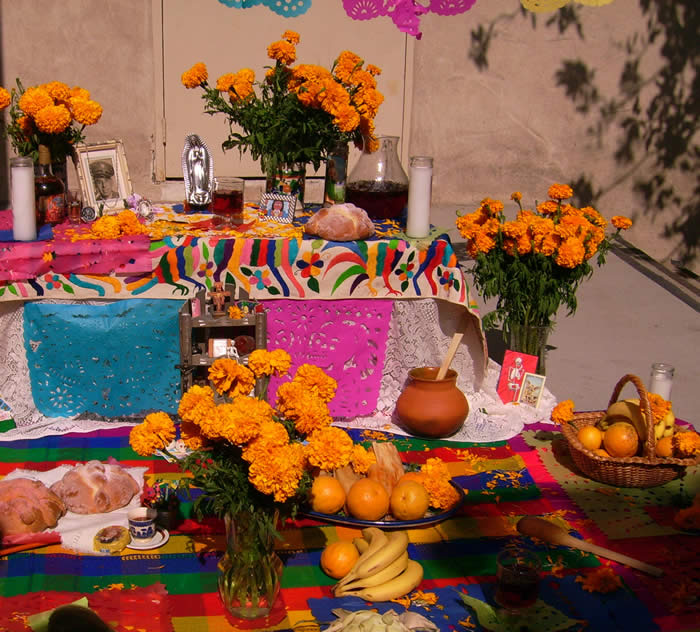EL DIA DE MUERTOS AND HALLOWEEN CULTURAL ROOTS
"All Saints’ Day"
While death is a topic largely avoided to speak about it, during October and November the remembrance of deceased ancestors and loved ones is traditional among diverse cultures around the globe, often marked by lighting candles or lamps and laying out offerings of food and drink.
Such celebrations can be traced back as far as the glory days of ancient Egypt when departed souls were honored during the great festival of Osiris.
Rituals celebrating the lives of dead ancestors had been performed by Mesoamerican civilizations for at least 3000 years.
It was common practice to keep skulls as trophies and display them during rituals to symbolize death and rebirth.
In Mexico, Day of the Dead is a holiday with a rare mix of pre-Hispanic and  Roman Catholic rituals. It is also a perfect illustration of the synthesis of pre-Hispanic and Spanish cultures that has come to define the country and its people. As part of the Hispanic traditions all over Mexico and most of the Latino communities around the world, there are displays of floral tributes called “altares”, and regional repast and candlelight vigils in each local cemetery are integral to the November 1 and 2 celebrations.
Roman Catholic rituals. It is also a perfect illustration of the synthesis of pre-Hispanic and Spanish cultures that has come to define the country and its people. As part of the Hispanic traditions all over Mexico and most of the Latino communities around the world, there are displays of floral tributes called “altares”, and regional repast and candlelight vigils in each local cemetery are integral to the November 1 and 2 celebrations.
In Brazil, it is a public holiday in which many Brazilians celebrate it by visiting cemeteries and churches, bringing flowers, lighting candles and praying.
In the Philippines, it is called “Araw ng mga Patay” (Day of the Dead), “Undas” or “Todos Los Santos” (since this holiday is celebrated on November 1, designated by the Catholic Church as All Saints Day) and has more of a “family reunion” atmosphere.
In the Chinese tradition, the seventh month in the Chinese calendar is called the Ghost Month in which ghosts and spirits come out from the lower world to visit earth.
In America, Halloween is an observance celebrated on the night of October 31 most notably by children dressing up in costumes and going door to door collecting sweets. Halloween originated in Ireland as the pagan Celtic harvest festival Samhain. Irish, Scots and other immigrants brought older versions of the tradition to North America in the 19th century. Most other Western countries have embraced Halloween as a part of American pop culture in the late 20th century. The term Halloween, and its older spelling Hallowe’en, is shortened from All-hallow-even, as it is the evening before “All Hallows’ Day”, also known as “All Saints’ Day”.
Despite the “dead” or “hallow” subject matter, Mexicans celebrate Day of the Dead joyfully and, though it occurs at the same time as Halloween, All Saints’ Day and All Souls Day, the traditional mood has an emphasis on celebrating and honoring the lives of the deceased.
The ancient Celtic peoples believed that from sundown to sunup of the holiday of Samhain (later All Hallows Eve and Halloween) the mortal world and the spiritual world were closer and more easy to travel between them than at any other time of the year. This was the time that people who had died could most easily visit the mortal world. The dead walk around on that night. So this is how the practice of dressing up in costumes and begging door to door for treats on holidays goes back to the Middle Ages.
Trick-or-treating resembles the late medieval practice of “souling,” when poor folk would go door to door, receiving food in return for prayers for the dead on All Souls Day.
Following the tradition of the “October-November special holidays of “All Hallows’ Day”, also known as “All Saints’ Day”, we are honoring the lives of some of the American celebrities whose lives were shortened by tobacco use.
| |
![]()
About Us | Privacy Policy | Disclaimer | Contact Us TEL. 619-427-4111 EMAIL: health@infooption.com
Salud + Health Info is for information and educational purposes only. You should not rely on this information as a substitute for personal medical attention, diagnosis or hands-on treatment. If you are concerned abut your health or that of a child, please consult your family’s physician or health provider immediately and do not try and diagnose yourself.
Copyright © 2001-2006 Info Option Network
 info
info